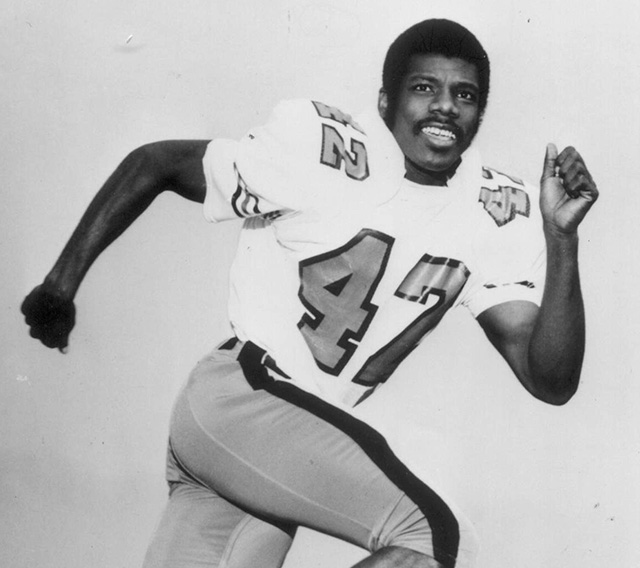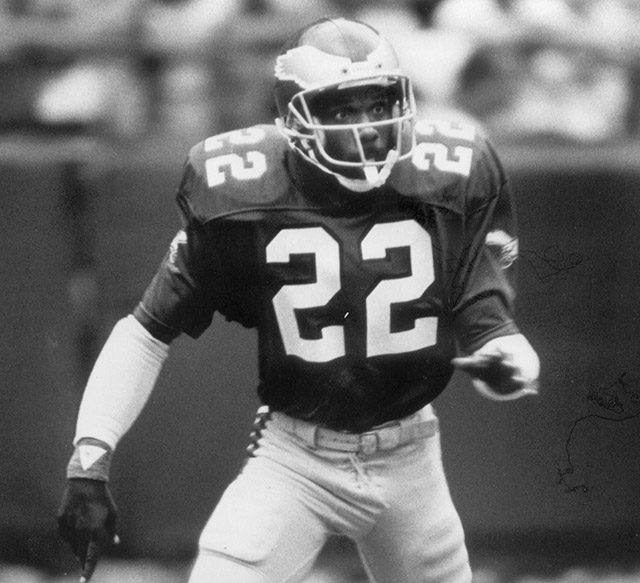Oct. 22, 2014

Commodore History Corner Archive
When former Vanderbilt safety Brenard Wilson (1974-77) completed his schooling at Father Lopez Catholic High School in Daytona Beach, Fla., he was being recruited by a future NFL Hall of Fame coach. Bill Parcells had recruited Wilson for Florida State while he was there as an assistant coach. Parcells left FSU to join new Vanderbilt head football coach Steve Sloan in 1973 as linebackers coach. One year later, Wilson became a freshman Commodore.
“I was going to Columbia, but Bill Parcells recruited me to Florida State then to Vanderbilt,” said Wilson. “I thought I was a better basketball player, but only the smaller schools talked to me about playing basketball for them. At that time I became interested in becoming a doctor and to pursue a medical degree. Steve Sloan was like a big brother to me and that appealed to me. He was only 29 years old.”
Wilson had narrowed his choices to Columbia and Holy Cross. Both schools would offer him the chance to play both football and basketball. Florida and Miami were also interested, but only in football.
At the time Wilson was a freshman and eligible for varsity play. However, schools formed freshman teams competing against each other in the SEC. Later that year, Wilson was promoted to the varsity and saw little playing time. The 1974 season would be historic for Vanderbilt. The Commodores finished with a 7-3-1 record and played in the Peach Bowl in Atlanta for just the second bowl appearance in the program’s history.
“That year I was actually redshirted and I traveled with the team,” Wilson said. “I realized they could bring you off a redshirt if anyone was hurt, but I didn’t want that to happen. Initially I did not want to be redshirted and that season I did contact several coaches about transferring and playing basketball. But my father passed away in November and I chose to be with my family. I didn’t go to the Peach Bowl. I wasn’t sure if I was coming back to Vanderbilt. I was going to have to take care of my family.”
After the Peach Bowl’s 6-6 tie with Texas Tech, Sloan shocked the Nashville and Vanderbilt community by leaving Vanderbilt for Texas Tech. Memphis State head coach Fred Pancoast would replace him.
“I didn’t like that change because I took it personally,” Wilson said. “Then after a while I realized I was a student-athlete and a student first and athlete second. My mother encouraged me to stay at Vanderbilt and to receive my degree. So that is what I did. I thought I was going to have to support my family, but my mother said she would make her way so I came back.”
Parcells followed Sloan to Texas Tech and left the college ranks for the NFL, where he was an assistant before becoming a head coach for the Giants, Patriots, Jets and Cowboys. He won two Super Bowls following the 1986 and 1990 seasons with the Giants.
“He recruited me to Vanderbilt so I give credit to him,” Wilson said of Parcells. “I thought he got the best out of his players more than any coach I’ve been around. He just did it his way. When I was in Philadelphia, and he was in New York after the games we would talk about the time at Vanderbilt. He was the defensive coordinator at first then he became a head coach. At first he was doing things other people’s way then he started to do it his way. Some of the things he did in college he couldn’t get away with in the NFL.”
In 1975, Wilson was a sophomore on a 7-4 Commodore team. He was a starter at cornerback and later in the season moved to safety. At the time there were not as many bowl invitations as now and winning six games didn’t automatically earn a team a bid. Vanderbilt was excluded from bowl consideration in 1975. The highlight of that season was a 17-14 victory over Tennessee in Knoxville.
“The only thing from that year I couldn’t believe was we didn’t get a bid to a bowl game,” Wilson said. “I guess they figured we wouldn’t beat UT. We won the last four games to finish at 7-4 and by the time the season was over all the bowl games had selected their teams. To be honest being from Daytona and playing Tennessee was not a big deal to me. I grew up a Florida, Florida State and Miami fan.”
In Wilson’s junior and senior years, Vanderbilt was 2-9 each season. Wilson was named a second team All-SEC selection both times.
“I would say the biggest thing in the SEC was the platooning against us,” Wilson said. “We didn’t have the depth and was worn down. I still remember looking across the field at Alabama and they had 100 guys. I was the 45th guy to sign at Vanderbilt. You could have as many players as you wanted. The other coaches just kept playing to wear us down. And we were worn down. Our first 11 on both sides of the ball were just as good as the other team’s starters. But the younger players at Vanderbilt were not as good.”
Wilson was not selected in the 1978 NFL draft, but did sign as a free agent with Philadelphia.

“I thought I was going to be drafted, but you don’t know until draft day,” Wilson said. “Some teams did tell me they were going to draft me. It depends on what their needs are. I took the roster of most of the NFL teams and looked to see how old their (defensive backs) were. Then I just said, `I know I can beat out that guy.’ The other teams that I really wanted to play for had DBs in their 20’s. I’d have to go against a young guy that has played a few years. You look at a team roster and he is 36 years old. You gotta say in your mind, `I can beat out a 36-year old.'”
Wilson had a successful training camp with the Eagles, but was one of the last players cut. He returned to Nashville to work in a bank when the Eagles gave him a call the next spring.
“When I redshirted at Vanderbilt I was able to graduate in December 1977 before the draft,” Wilson said. “I actually went to work for Commerce Union Bank. That was my first job. Then the bank actually gave me a leave of absence to try out in the NFL. When the Eagles released me, I just went back to Nashville and my job at the bank. The Eagles called me back before camp in 1979 and re-signed me. I knew then I could play because I knew the competition and the players. At first you have no idea, but once I got there I knew I’d play a lot.”
Former Vanderbilt teammate Dennis Harrison also played with the Eagles at the same time as Wilson. Philadelphia’s coach was Dick Vermeil, who was in his third season leading the Eagles. Vermeil was a very emotional person that would openly weep in public.
“He got me with his emotions,” Wilson said. “It probably wore thin with the veterans. He was an emotional guy. He was genuinely concerned about his players. That is what I liked the most about Coach Vermeil. It is beyond being the head coach. He was concerned about you and your family. That was important.”
Wilson won a starting job as a rookie in 1979, and played in his first 14 games. He missed the rest of the season with an ankle injury, but led the team with four interceptions. In 1980, Wilson started every game and led the Eagles with six interceptions. The Eagles won the NFC championship that season, but lost to Oakland 27-10 in Super Bowl XV in New Orleans.
“In that game we had missed opportunities and the Raiders didn’t,” said Wilson. “For me personally I believe we would have beaten the Raiders nine out of 10 times. But it doesn’t make a difference in the Super Bowl. It is just one game. Jim Plunkett was the Raiders quarterback in that game. He was actually the backup. Dan Pastorini was actually the starter, but was injured.
“We played them in the preseason, the regular season and the Super Bowl. They were the first wild card team to win the Super Bowl. We beat them 10-7 in the regular season so we knew we were close with them. You have to take advantage of missed opportunities.”
Wilson’s last year in Philadelphia was 1986. At the end of his playing days, Wilson was a backup as a safety, free safety, cornerback and played nickel back. With the Eagles, Wilson played in 117 games (62 starts), recorded 355 tackles (241 solo) and had 17 career interceptions for 251 return yards (14.8 avg.). Wilson collected two interceptions at Buffalo in 1981 and his longest return was for 50 yards against the Giants in 1979.
Wilson played one final season with Atlanta in 1987 where he played in nine games. Wilson said he did not have a memorable interception, but remembered the ones he did not catch. In his nine seasons as an NFL player his proudest moments were beating Dallas in the NFC championship game to play in the Super Bowl and the indescribable feeling of playing in the Super Bowl.
So who was the toughest receiver for Wilson to cover?
“Jerry Rice,” said Wilson. “The harder you hit him the tougher he got. That didn’t happen with a lot of receivers. You throw them on their head and all of a sudden they aren’t as tough as they used to be. But if you threw Jerry Rice on his head, he’s going to get up and be even tougher.”
Wilson came back to Nashville after retiring from the NFL. He became a secondary coach at Southeast Missouri State, where he worked with Jon Gruden. Wilson came back to Nashville to start a real estate business and coach Nashville area high school teams as a non-faculty coach.
He was also an assistant coach with the now defunct Nashville Kats, an Arena Football League team. Wilson now helps out at Mt. Juliet Christian Academy. His son, Brenard Wilson, Jr., played football and was a member of the track team at Nashville’s Hunters Lane. He was a star track athlete at the University of Tennessee.
“I’ve been in the real estate business,” said Wilson. “When I was player, we had invested in real estate. And in 1989, when I retired we incorporated and my wife got involved. Initially I just did it for my own personal portfolio. When we incorporated we began working for other people. Our company is Brenard Wilson Investments Incorporated.”
If you have any comments or suggestions contact Bill Traughber via email WLTraughber@aol.com.


